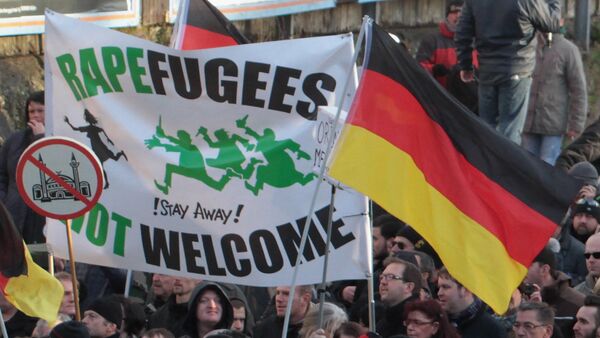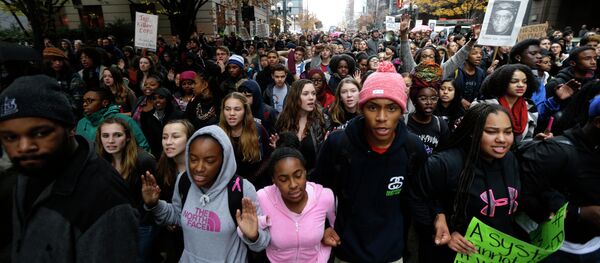Sputnik discussed the issue with Dr. Russell Foster from the Department of European & International Studies at King's College London.
Sputnik: How could Austria's acceptance of its right-wing government line up compared to what's happening in other European countries and how could we explain this?
Dr. Russell Foster: In the last couple of years, we've seen a very marked swing in European voting attitudes towards nationalism, towards the traditional right, and towards a new phenomenon which we are researching, called the new right, which is different from the old fascist vector.
Sputnik: How could we define this new right? Are there specific features that determine it?
Dr. Russell Foster: There are. The traditional old-right is much more traditionalist and socially conservative.
The new right, which is emerging, is appealing to younger, better educated, urban populations, the ones who we traditionally associate with the left; it's also embracing social liberalism.
READ MORE: 'Too Right-Wing': UK Student Kicked Out of Class for Defending Tommy Robinson
Because so much of the migration crisis has been from the Middle East's socially conservative countries, we've seen these new right movements, identitarian movements which embrace feminism, which embrace gay rights, which embrace the Jewish community and the Sikh community and these other minorities as a way of saying: 'We are defending liberal values against a perceived intolerant, conservative Islamic other.'
It's important to say that this is a perception of Islam, not a reality, but this sort of rhetoric, this sort of ideology as we've seen in the last couple of years is getting quite a lot of support with the European voting populations.
Sputnik: Indeed, right-wing ideology, eurosceptic sentiments seem to be on the rise in certain European nations. Germany, yes where AfD is gaining ground, Sweden…what brings about the sentiments and would you say it's the younger segment of the population that respond to them?
Dr. Russell Foster: I think that there are. To answer your first question as to what is causing this, there's a general dissatisfaction with the status quo all across the Western world, but especially in Europe.
As we saw in Brexit, as we saw in the 2017-2018 elections in Europe, lots and lots of people feel they are ignored and abandoned by governments. There's a growing divide, what we call a medieval divide, between this aristocracy who exist in capital cities, who feel that they have more in common with their peers in other countries than with the fellow nationals in the same country, so we've got this transnational aristocracy who dominate media, governments, corporations, and then beneath that there is the class of the left behind, the people who live in postindustrial towns, who live in failing agricultural areas, who feel that the governments in London, in Rome, in Warsaw are not looking after them and have largely forgotten them.
As a consequence, something like migration comes along and it becomes a catalyst for people's resentment with their own governments to spill over into these new right movements, and yes, it does seem to be gaining traction among young people.
READ MORE: "I Don't Care if I Incite Fear of Muslims" — Tommy Robinson in Latest Interview
Let's not forget that compared to previous generations, young people in Europe today have got much less security, it's much more difficult to get a job, other than a zero hours contract or a temporary contract, it is difficult to get on the housing ladder, standards of living are declining as a result of austerity and so with this combination of feeling left behind, alongside poor economic prospects, these right-wing movements with their seductive ideology, they can look very, very appealing.
Sputnik: I'm guessing that these sentiments are here to stay for quite some time…
Dr. Russell Foster: I can't foresee them going anytime soon. The problems that Europe is facing now are a mixture of spontaneous problems, like the migration crisis, nobody saw that coming five years ago, along with structural problems: the economic issues in Europe, people feeling that EU is undemocratic.
One thing we've learned from Europe in the last 20 years is that it staggers from one disaster to the next; it always somehow survives, but problems will come along, disasters which no one can anticipate come along and have an impact on European citizens' voting behavior.
Something else will happen to Europe in the next few years, and the underlying resentment of national governments which feel alien, resentment of economic austerity, a sphere not only of immigration but of integration, of immigrants failing to integrate into society, these are going to be in Europe for years, if not decades to come.
Sputnik: And yet there is a bit of a discrepancy, a disproportionate attitude across Europe because some right-wing leaders like Marine Le Pen or Geert Wilders do not succeed or do well in France and the Netherlands, how could that happen?
Dr. Russell Foster: Well it depends on how we define success, so let's take the Dutch and the French, and the Germans as well, who all had major elections last year. In those three countries Geert Wilders, Marine Le Pen and Alternative for Deutschland (AfD) failed to get a majority government, but in a way, they had an enormous success because their popularity forced the mainstream parties to shift their rhetoric further to the right.
The views expressed in this article are those of the speaker and do not necessarily reflect those of Sputnik.




